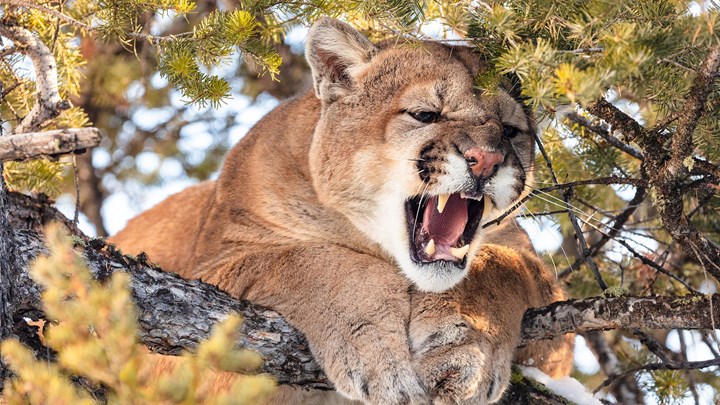
by Mark Chesnut - Friday, September 29, 2023

Colorado anti-hunters have managed to get a ballot initiative approved for the upcoming November election that could have a devastating effect on both wild game populations and hunters.
If approved by voters, Initiative 91 would end the age-old practice of hunting predators, such as mountain lions, in Colorado. Not only would such a move curtail recreational opportunities for those who hunt the animals, but it would also inhibit the ability of hunters and state wildlife managers to manage the growing predator populations through hunting.
As with most such anti-hunting proposals, NRA’s Institute for Legislative Action (NRA-ILA) is alerting members on the initiative and actively working to try to head off the misguided effort.
“We successfully stopped the bill in the Colorado General Assembly last session as legislators rightfully saw that leaving science-based decisions in the hands of the state wildlife experts is the best way to manage and protect wildlife populations,” said Travis Couture-Lovelady, NRA-ILA Colorado State Director. “This action is an effort to sidestep the legislative process and would inhibit the ability of hunters and state wildlife officers to manage the growing predator populations through hunting.”
As Couture-Lovelady added, “This will lead to overpopulation, further damage to the elk and deer herds, and even more interactions of predators with the public. The North American Model of Wildlife Conservation requires the presence of hunters on the landscape and is heavily regulated and controlled by biologists and state wildlife agencies. It is, by far, the most successful conservation model in the world.”
Interestingly, Colorado doesn’t exactly have a dwindling population of mountain lions. In fact, it has the largest population of the big cats of any state, with estimates nearing 7,000 animals.
Of course, banning hunting for predator species has been tried before, most notably with wolves, resulting in greatly expanded predator numbers and greatly reduced prey (big game) populations. This not only directly affects big game populations, but drastically reduces hunting opportunities, leading to a reduction in the number of hunting licenses and tags sold. In the end, fewer hunting licenses sold—and the resulting lost revenue—negatively affects the state wildlife agencies charged with wildlife management.
To make matters worse, Colorado wildlife managers are already having to deal with pending gray wolf reintroductions by early 2024, thanks to animal rights extremists groups’ ballot measure titled Proposition 114 that passed by less than 1 percent—50.3 percent to 49.7 percent—in November 2020. More lions due to a hunting ban combined with wolf introductions would almost certainly lead to greatly depleted large game populations.
Like many such proposals, Initiative 91 seeks to manage wildlife through feel-good emotion and politics instead of time-proven wildlife science and legal, regulated hunting as a wildlife management tool. Colorado already has a well-thought-out mountain lion management plan in place that was instituted back in 2020.
As the management plan discusses in depth, one of the reasons hunting the big cats is important is because of human-mountain lion interactions, which are increasing as people move into borderline rural areas long inhabited by mountain lions.
“These human-lion incidents vary and run a continuum from mere sightings, depredation of or altercations with pets or hobby livestock, to human attack and injury or fatality,” the plan states. “Given the current human population in Colorado and the anticipated population growth in the future, lion conflict levels will likely increase, especially in those areas where people continue expansion of human developments into occupied lion habitat.”
Unlike what proponents of Initiative 91 would have you believe, hunting for mountain lions in Colorado is already very tightly regulated. First, it is illegal to obtain a mountain lion license or hunt lions in the state without a mountain lion education certificate issued by Colorado Parks and Wildlife (CPW). The number of lions harvested during any given season is also tightly regulated and monitored on a daily basis. During active lion hunting seasons, hunters are required to check the Available Lion Harvest Limit Report for unit closures after 5 p.m. the day prior to their planned hunt.
Additionally, successful hunters must contact a CPW office within 48 hours of a lion kill and provide their name, customer identification number, date and unit of kill, and sex of the lion. Within five days of harvest, successful hunters must personally bring their lion to a CPW office or officer for inspection and seal.
As part of its lion management program, CPW also requires that hunters allow collection of a small tooth located just behind the lion’s upper canine. The collected teeth are analyzed to determine the age of lions in order to better manage lion populations in the Centennial State.
The ballot measure has been scheduled for a review and public comment hearing on Oct. 6 at 10 a.m. Click here for information on how to submit digital public comments.
About the Author
Freelance writer and editor Mark Chesnut is the owner/editorial director at Red Setter Communications LLC in Jenks, Okla. An avid hunter, shooter and field-trialer, he has been covering Second Amendment issues and politics on a near-daily basis for nearly 25 years.
E-mail your comments/questions about this site to:
[email protected]
Proudly supported by The NRA Foundation and Friends of NRA fundraising.
